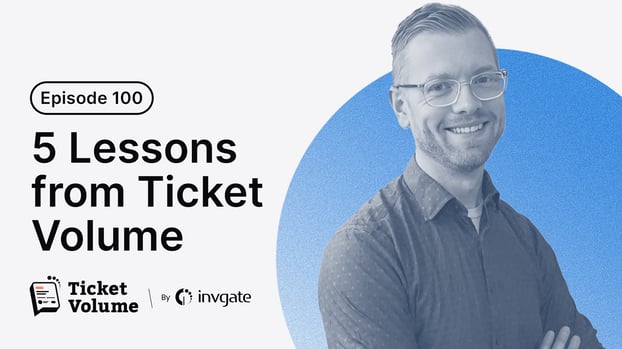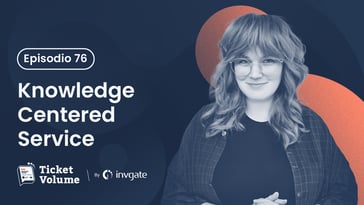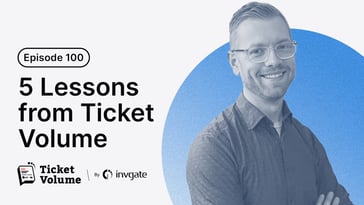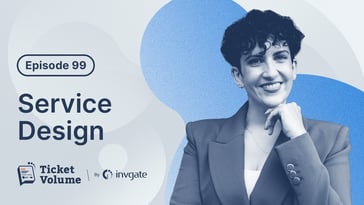Ticket Volume – IT Podcast just hit its 100th episode — a huge milestone that wouldn’t have been possible without our incredible audience. From the very beginning, your support, shares, and thoughtful feedback have kept the show going strong.
To celebrate, we decided to do something a little different. Instead of bringing in a new guest, we put our host, and InvGate Product Specialist, Matt Beran on the spot. This time, he’s the one doing the reflecting — on the podcast’s journey, what it’s meant to him, and the lessons it’s taught him over the years.
Matt came up with five big takeaways that sum up his experience. And along the way, he also highlighted some of the episodes that stood out the most — the ones that surprised him, taught him something new, or just felt different in the best possible way.

5 insights after 100 episodes of Ticket Volume
After spending years talking with industry leaders, thinkers, and innovators, Matt realized he wasn’t just hosting conversations — he was learning, growing, and changing his own view of the IT world. Reflecting on this journey, he identified five key lessons that stuck with him the most.
Each one is a small piece of wisdom earned through listening, experimenting, and staying curious.
1. Nothing is as simple as it seems
In IT — and especially in Service Management — complexity is the norm. What looks straightforward on the surface is usually more nuanced underneath. Recognizing that complexity (instead of oversimplifying it) is the first step to meaningful progress.
2. Jumping to solutions isn’t always the answer
The instinct to fix things quickly is strong in IT. But sometimes, the real value lies in staying with the problem a bit longer. Understanding it fully, sitting in the discomfort, and digging deeper can lead to better, longer-lasting solutions.
3. What you think won’t help… sometimes does
On the flip side, ideas that seem unlikely or even silly at first can lead to breakthroughs. Matt learned to question assumptions and embrace experimentation — because you never really know what might work until you try it.
4. Focus on your strengths, and build a network to fill the gaps
No one can master everything — and that’s okay. One of Matt’s favorite lessons was realizing how powerful it is to lean into what you’re good at, while surrounding yourself with people who bring different skills and perspectives.
5. People are the most important part of technology
At the end of the day, technology is built by people, for people. Without them, it has no value. Whether it’s collaboration, innovation, or simply creating impact, humans are at the core of every success story in IT.
Episodes that made a lasting impact
Of course, we remember every single episode — and we’re grateful to every guest who joined us along the way. Each one brought something unique to the table, and Ticket Volume wouldn’t be what it is without their insight, stories, and time.
But some conversations stuck with Matt for different reasons. Maybe they sparked a new idea, challenged his perspective, or simply surprised the team with how they resonated with the audience.
Here are a few standout moments from the journey so far:
Episode 90 – Change Enablement with Jamf
Episode 90 opened Matt’s eyes to the real power of Change Enablement. Melissa Dunham, Kyle Carlson, and Minta Walders didn’t just talk theory — they showed what it looks like to build a Service Management function in real life.
Their approach to collaboration, clarity, and making change work with people (not to people) left a lasting impression. And yes, Matt confirmed: it wasn’t just smoke and mirrors. They’re really doing the work.
Live session – Experience Management
This live session became one of Matt’s personal favorites. Guests Jon Leighton and Emily Schick explored how IT Experience Management goes beyond metrics — it can influence someone’s mood, their day, even their family life.
The conversation was a powerful reminder that what we do in IT has a real, human impact. Experience is no longer a buzzword — it’s where smart organizations are investing today.
Episode 87 – Mental health and neurodiversity in tech
Episode 87 ran nearly twice as long as usual — and for good reason. Joined by Dr. Torres, Eileen Day, and Emily Hubbard, Matt dove into mental health, neurodiversity, and how IT leaders can better understand and support the people behind the screens.
It scratched a personal itch for Matt and planted the seed for a future follow-up episode. Because if people are the most important part of technology, we need to talk about their wellbeing, too.
Episode 20 – Silos, design thinking, and accountability
One of the early audio-only episodes, and a fan favorite. Greg Sanker brought his usual energy to a wide-ranging conversation about collaboration across silos, the value of design thinking, and the often-overlooked relationship between IT and HR.
Episode 20 also touched on accountability — and why it matters even more in an AI-driven world. This episode challenged Matt to rethink a lot of assumptions.
Episode 78 – Data, life, and techno-spirituality
Chris Dancy isn’t your typical ITSM guest. He’s a self-described techno-pagan who’s constantly experimenting with how tech and data intersect with daily life. From building immersive AI experiences to redefining personal productivity, episode 78 is packed with practical tips and mind-expanding ideas.
Matt’s favorite moment? The SLA of taking out the trash.
Episode 97 – Governance and uncomfortable truths
With wisdom and clarity, Valence Howden unpacked the realities of governance: how people behave during failure, how power struggles shape culture, and why not everyone always works toward the common good.
It wasn’t always easy to hear, but it was real — and necessary. Episode 97 made Matt reflect deeply on leadership, culture, and the systems we build. A must-listen for anyone navigating internal politics or organizational change.
Some final thoughts
Reaching 100 episodes wouldn’t have been possible without you. Every listen, share, and comment helped shape what Ticket Volume is today.
As Matt reminds us, this podcast runs on curiosity, gratitude, and community. And as we move forward, we’re excited to keep learning, exploring, and growing — together.
Thanks for being part of the journey.















